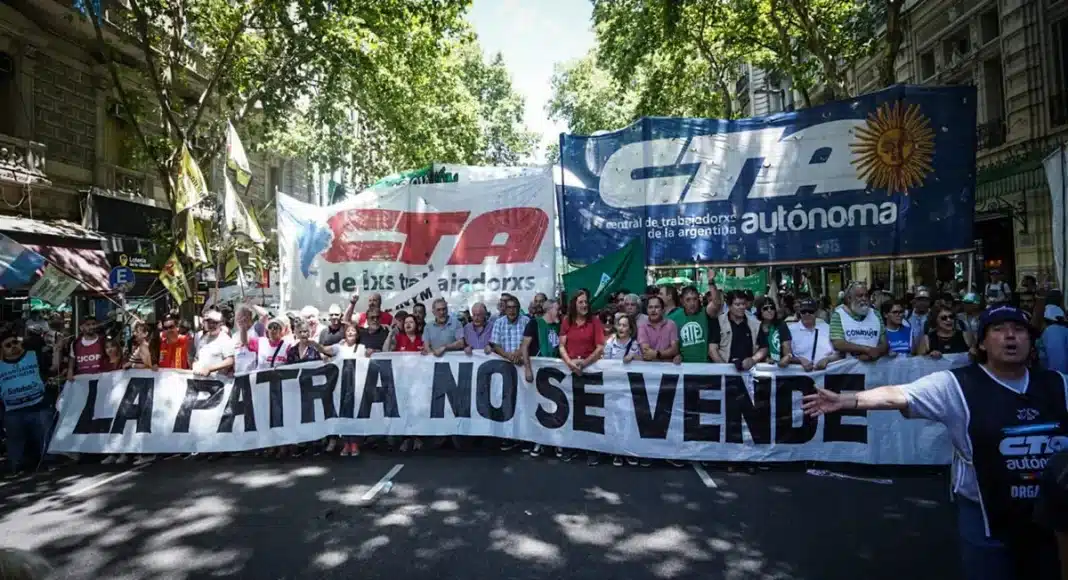On 10 December Javier Milei, far-right economist, and TV personality, assumed the presidency in Argentina. His administration immediately introduced massive attacks on the working class. Two large demonstrations have followed as traditional unions struggled to thwart Milei’s plans.
Milei’s ‘Chainsaw Plan’ consists of slashing public spending, selling state-owned companies and promises to eliminate the central bank. His ‘shock treatment’ started with a 54% devaluation of the Peso on 14 December. By January inflation had risen to 212%. With 40% of Argentinians living below the poverty line and more than 9% in destitution, workers fear their incomes will be insufficient for food and transport.
On the same day, a new repressive protocol against street demonstrations was announced by the Minister of Security Patricia Bullrich. The four security forces – the Federal Police, the Gendarmerie, the Naval Prefecture and the Airport Security Police – have been grouped under the Ministry of Security and have been granted the power to arrest those who ‘commit crimes’ during protests, to act on public transportation to seize protest material and to investigate ‘hooded’ citizens and demonstrators.
Bullrich also announced the creation of a national registry of people and organisations who ‘instigate’ protests, to whom she will ‘send the bill’ for ‘the expenses’ of repression, and that foreign residents with a temporary permit who participate in protests will be reported to the Immigration Services.
Milei’s plans include closing government ministries, reducing subsidies and removing price controls on energy and transportation, and freezing public works. ‘Naturally it will have a negative impact on the level of activity, employment, real wages, the number of poor and indigent; there will be stagflation’ Milei said in his inaugural speech, but ‘there is no alternative’. Slashing public spending was symbolised at his political rallies by waving a chainsaw.
On 20 December, the Decree of Necessity and Urgency (DNU) was announced with 366 articles allowing the president to change and revoke laws unilaterally. One will allow businesses to pay in any currency, including bitcoin. It restricts the right to strike by essential workers in hospital services, education and transport, and makes it easier to fire employees.
Argentinian workers refused to tolerate the government’s attacks on their rights. Thousands poured onto the streets of Buenos Aires chanting ‘Workers’ unity!’ after Milei announced this decree, which contains dozens of other anti-worker economic measures that would impact wages and healthcare. It overturns laws that protect workers and it limits benefits such as severance pay and maternity leave. It effectively completely deregulates the economy. This demonstration took place outside the Justice Palace, attended by thousands. ‘Set the date! Set the date!’ was the demand of protesters for a general strike to be called by the main labour unions. Protests were met with riot police, who failed to keep the demonstrations away from the road due to the high turnout, and concluded with two arrests.
Just a week later, an ‘Omnibus Bill’ was submitted to Congress, preposterously and insulting titled ‘Foundations and Starting Points for the Liberty of Argentinians’. It declared a ‘state of emergency’ that could last until the end of Milei’s term in office. This anti-democratic bill would grant legislative powers to the government in economic, fiscal, taxation, and electoral matters and includes measures that further attack fundamental rights of workers, pensioners and protesters. The legislation is supported by big businesses and the International Monetary Fund that manages the Argentinian debt crisis and holds billions of dollars of national debt.
General strike
It did not take long for Milei’s government to face another big demonstration in response. On 24 January the biggest trade unions, the General Confederation of Labour (CGT) and Argentine Workers’ Central Union, were joined by many other civic groups and organisations participating in the first (12-hour) national strike for four years against the new ‘Omnibus Law’.
The police, as promised by Bullrich, responded to the peaceful demonstrations with repression. Riot teams interrupted traffic, got on buses to prevent people from joining the march and, as it was starting to disperse, some protesters were followed, beaten and, at least six of them, arrested.
The unions consider they have three ways to address the government’s measures: the judiciary, Congress, and the streets. Although the CGT’s application of amparo against Milei’s DNU was rejected by the Labour Justice, their appeal managed to freeze some measures of his decree. On 3 January, the National Chamber for Labor Appeals suspended one of the labour reforms which, among other things, increased the legal job probation period from three to eight months, reduced compensation in case of dismissal and cut pregnancy leave.
At the time of writing, both the DNU and the Omnibus Bill are still to be debated in Congress. ‘We will not be defeated as long as we remain united’, said Héctor Daer, secretary general of the CGT, on social media. The central issue however is how the mass of the people will force their way onto the scene to remove Milei.
FIGHT RACISM! FIGHT IMPERIALISM! 298 February/March 2024




